“If you go anywhere in the world and tell someone that you are an FBI special agent, you will immediately have their respect.”
FBI Director Robert Mueller during a New Agent Graduation Ceremony
It’s one of the most important missions of the FBI Academy: minting new agents.
Each special agent must have the knowledge, skills, commitment, and intestinal fortitude to investigate terrorists, spies, and a raft of dangerous criminals—all while wielding their law enforcement powers with compassion for those they encounter and respect for the U.S. Constitution and the laws they enforce. It’s the job of the FBI Academy to get agent trainees ready to serve skillfully and faithfully, and when necessary, to send students home if they aren’t fit to be FBI agents.
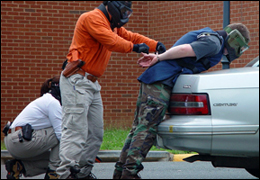 |
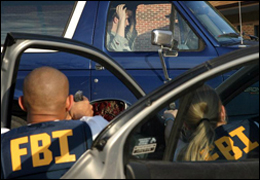 |
For the agents in training, just getting in the door hasn’t been easy. They’ve competed against hundreds of thousands of like-minded Americans in one of the most rigorous and selective application processes in the nation. In some cases, they’ve given up high-paying jobs in the private sector for the opportunity to serve their country. Now, the recruits must spend countless hours studying everything from ethics to investigative techniques, learning about Bureau operations, gaining experience in conducting intelligence-led investigations, fine-tuning their computer skills, and pushing their bodies to their physical limits.
More than 800 new agents are expected to graduate in Fiscal Year 2009.
New agent training lasts 20 weeks.
It’s a tough regimen, but trainees don’t go it alone. They are supported by their classmates—who become close friends and partners over the course of their time together—and by class supervisors, counselors, and instructors who challenge and uplift them.
The basics.
The 20 weeks of training includes 850 hours of instruction (including 63 hours that are web-based) in four major concentrations: academics, case exercises, firearms training, and operational skills. In April 2008, we launched a revised curriculum that places more emphasis on the collection and use of intelligence by special agents.
Academics.
Agent trainees study a broad range of subjects that grounds them in the fundamentals of law, ethics, behavioral science, interviewing and report writing, basic and advanced investigative and intelligence techniques, interrogation, and forensic science. Students learn how to manage and run counterterrorism, counterintelligence, weapons of mass destruction, cyber, and criminal investigations—so they are flexible and well rounded and able to handle any case upon graduation. Trainees must score 85 percent or better on exams in three legal disciplines, interviewing, national security investigations, criminal investigations, and interrogation.
Case exercises.
We use case exercises to test the trainees’ mettle in real-life situations and mirror what they will experience in the field. For example, the students are given an integrated case scenario that starts with a tip and culminates in the arrests of multiple subjects. The investigation plays out on the streets of Hogan’s Alley, our mock town at the Academy that features hired actors playing criminals and terrorists. Another practical exercise—called Capstone—uses culturally diverse role players in a terrorism and intelligence-driven scenario. Trainees also get the chance to present evidence in a moot court.
Firearms.
Since the mid-1930s, special agents have been authorized to carry firearms. Agents rarely fire their weapons in real-life situations, but they must be experts with firearms when they leave the Academy and must maintain their skills throughout their careers. Today, agents in training must qualify with a Bureau-issued handgun and shotgun. For the handgun, students must shoot a minimum of 80 percent or better on two of three record attempts on the qualification course. The cumulative score must average 80 percent or better on all three record attempts. For the shotgun, trainees must shoot a minimum of 80 percent or better on one of two record attempts. The students must also demonstrate familiarity with the Bureau submachine gun and the Bureau carbine. Agent trainees fire approximately 3,900 rounds of ammunition during their 20 weeks at the Academy. They also participate in drills using simulated firearms training equipment—much like a sophisticated video game—that tests their ability to make split-second decisions in life-or-death situations.
 |
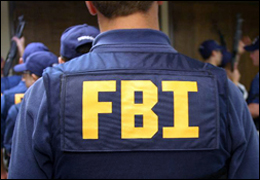 |
Operational skills.
This concentration includes everything from defensive tactics to surveillance…from physical fitness to tactical driving. Defensive tactics training focuses on boxing and grappling, handcuffing, control holds, searches of subjects, weapon retention, and disarming techniques. Safe driving techniques are provided at our Tactical Emergency Vehicle Operations Center at the Academy.
Trainees also receive more than 90 hours of instruction and practical exercises focused on tactics, operations planning, operation of cooperating witnesses and informants, physical and electronic surveillance, undercover operations, and the development and dissemination of intelligence. At Hogan’s Alley, trainees conduct interviews, plan and carry out an arrest, perform day and nighttime surveillance, and put to use street survival techniques taught by their instructors. Real-life exercises include a bank robbery, a kidnapping, an assault on a federal officer, and both compliant and armed and dangerous arrest scenarios. Trainees use paint guns to test their tactical skills.
Physical training.
You’ve got to be in great shape and be able to withstand the physical rigors of the job to be a special agent. As a result, agent trainees get a variety of fitness training and must pass a standardized physical fitness test. Tests are administered during the first, seventh, and fourteenth weeks of the session. To pass the test, trainees must achieve a minimum cumulative score of 12 points with at least one point in each of four areas: sit-ups in one minute; timed 300-meter sprint, push-ups (untimed), and timed 1.5-mile run. See the FBI Jobs website for the scoring scales in each event
and protocols for the physical fitness test (PFT).
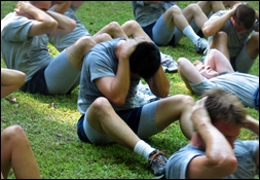 |
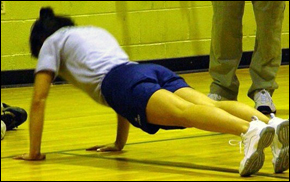 |
Class leadership and instructors.
A select group of supervisory special agents from the Training Division serve as class supervisors for the session. A rotating pair of special agents from our field offices—called field counselors—also spend all 20 weeks at the Academy with the new agent trainees, providing advice,
counsel, and
support. The students are trained by full-time instructors from the Training Division and by experts in counterterrorism, intelligence, forensics, and other areas from across the Bureau. Over the course of the session, our New Agents Training Unit evaluates the trainees to make sure that they are ready to become FBI special agents.
Graduation.
After the trainees successfully complete the 20-week training program and are judged to be models of the FBI’s core values, they are ready to graduate. At a special ceremony attended by the students’ family and friends, the FBI Director or his representative swears in the new agents and presents them with their badges and credentials. The class spokesperson, selected by the budding agents, addresses the recruits and their families on the challenges faced and obstacles overcome during the training.
One new agent is selected by his or her classmates and staff to receive the Director’s Leadership Award, and honors are also handed out for top achievers in academics, firearms, and physical fitness.
As they leave the Academy, the new agents pick up their firearms and ammunition. They are now ready to head out to their first office of assignment and begin work as FBI special agents. They will return to the Academy often for specialized training and refresher courses throughout their careers.
For more information:
- Applying to become an FBI Agent
FBI Academy home


